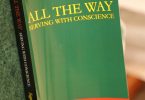Awolowo on Education
AWO’s defense of the right to education (PNG, 164-172) is based on a philosophy of family relations between the paterfamilias and materfamilias and the children. We bring children into the world. That act comes with a heavy dose of responsibility which was not lost on our ancestors even without the benefit of formal education themselves. They knew well that they had to train their children so they can assume their role as grownups.
Consider the following empirical claim by AWO:
“Many rights are enjoyed within the family; these rights are fundamental and inalienable, because the urge for their enjoyment is inherent and instinctive in man….. Because of their inherent and instinctive nature, these rights cannot be permanently suppressed. In the short run, they can be held in abeyance, but even only at great risks to the peace, harmony, and cohesion of the family.” (PNG, 164)
On this basis, he provides a list of 12 rights, which includes the right to life, right to freedom from torture, right to freedom from slavery or servitude, right to freedom from interference with privacy, right to freedom of expression, right to freedom of assembly and association, right to freedom of movement, right to freedom from discrimination, right to education, right to work and just reward, right to support in the event of sickness, disability, or old age, right to personal property, and to protection thereof.
Out of curiosity we may raise the question whether the rights identified by Chief Awolowo here were indeed construed as rights in our traditional societies. That won’t matter much as he himself didn’t rely solely on the reality of these rights for his argument for educating the youth. Rather he anchored his argument on the “instinctive urge” on the part of parents, an urge which makes them “feel compulsively impelled to consider it their bounden and inexorable duty, as much as it is within their competence, to instruct their offspring to the best of the abilities of such offspring.” (165) In other words, one may feel an obligation or duty to someone (a child) without acknowledging a right on the part of the recipient. In the end, however, Chief Awolowo presents ideological, ontological, politico-economic, and moral arguments in support of the obligation of the state to educate its citizens.
From the ideological angle, the Nigerian government has a duty to freely educate the citizens who come from various ethnic groups with inherent right to education which they cannot be expected to give up upon their voluntary agreement to become citizens of Nigeria. But in case there is no such inherent right, the state, having taken over as the adoptive parent has a duty to educate her wards.
The ontological argument, on the other hand, is based on the nature of man as a living soul which must be nurtured through sound education so that the man/woman retains that quality of being above other animals. Since many cannot do this by themselves, the duty falls on the state.
On the politico-economic basis of the argument for free education, AWO insists that the rapid political economic development of Nigeria by Nigerians for Nigerians requires the full development and full employment of all Nigerians. To be fully developed is to be fully educated and this is the responsibility of the state.
On the moral argument, the state is construed as an institution with objectives to, among others, protect citizens, promote their welfare, and guarantee the exercise of their rights. It is immoral and unethical for the state to discharge its responsibilities to a small section of “haves” while a vast majority of “have-nots” are neglected.
With regard to practice, Chief Awolowo introduced the first universal free primary education system in the nation. Other regions soon followed. Those who still engage in disparaging and badmouthing that singular achievement cannot truthfully identify what else was responsible for the advancement of the region in the late fifties and up to the early eighties when there began a deliberate policy of reversal supervised by the military. The regional governments of the 1st Republic, in spite of their known deficiencies, ensured that government was responsible to the people. Members of the various regional Houses had their regular jobs for which they were accountable.
An educated citizenry is a vital bulwark against an uncaring and contemptuous government, the kind that we have been forced to endure in the last fifteen years. Without a good education, a citizen is at the mercy of those who see him or her as expendable and exploitable. Ignorant of their rights and ill-equipped for decent jobs, the uneducated become puns on the chessboard of the powerful and wicked. A human being with a good education doesn’t volunteer to become the thug of another. And a caring and compassionate politician with a sense of justice and fairness must feel the pinch of conscience when he or she exploits and takes undue advantage of fellow human beings.



